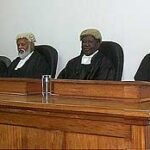Với Hi88, bạn sẽ được tận hưởng giao diện hiện đại, tốc độ xử lý nhanh và các sản phẩm giải trí đạt chuẩn quốc tế.
(MARILYN TATUM PLAINTIFF
BETWEEN (
(AND
(
(BELIZE AIRWAYS LTD. DEFENDANT
Supreme Court
Action No. 15 of 1978
28th, September, 1978
Sir Denis Malone, CJ.
Mr. Dean Barrow for the Plaintiff
Senator S.W. Musa for the Defendant
Contract of Employment – Repudiation – Earnings, loss of – Duty to mitigate loss – Damages – Quantum of.
J U D G M E N T
The claim is for wrongful repudiation of a contract. Liability was not admitted by the Defendant company, to which I shall refer hereafter as “B.A.L.”, but that there was a contract which it repudiated is not to my mind open to question, for the facts on that aspect of the case are the following. The Plaintiff, aspiring to be a flight attendant, which is B.A.L.’s description of an air hostess, applied to B.A.L., and was interviewed by B.A.L.’s Chief Stewardess, Miss Hurst, and was in December, 1977, both verbally and in writing accepted by B.A.L. The Plaintiff was and is a national of the Republic of Honduras. B.A.L. was at the time recruiting only Belizeans – a term which is not easily defined with precision but which does not include non-British nationals. It may be as the Plaintiff says, that at her interview with Miss Hurst she informed the latter of her national status. Whether she did so or not is not however of importance as I am satisfied that she was under no obligation to do so. What is clear is that she did not, at any time, conceal her true national status, nor did B.A.L. at any time before accepting her, disclose to her that it was only recruiting Belizeans. For I do not accept the suggestion that because the Plaintiff handed over her passport to B.A.L. a few days before she was due to leave Belize for Miami with the other recruits, that showed she was concealing her nationality nor the suggestion that because B.A.L. advertised for recruits in Belizean newspapers, that showed that B.A.L was only recruiting Belizeans. When the Plaintiff’s true national status first came to the attention of Mr. Shoman, the Manager of B.A.L. in Belize, he discussed with her the problem it created. It is agreed that he suggested to her two courses of possible conduct to overcome the problem. Failing which B.A.L., he said, could not employ the Plaintiff. One was to become a British subject. The other was to defer her training until B.A.L. began to recruit Honduras, and that Mr. Shoman explained would take place about June. Mr. Showman implied to the Court that had the Plaintiff deferred her training, B.A.L. could have recruited her as a Honduran. It is however not clear from his evidence that he in fact assured the Plaintiff that B.A.L. would employ her as a Honduran and the evidence of the Plaintiff, which I accept, is that he did not give that assurance.
An attempt was made by the Plaintiff to change her nationality, but if even the British authorities had been wiling to accept her, the necessary formalities could not have been completed in the time available. The Plaintiff declined to accept the alternative. It may be that given more time B.A.L. might have been able to persuade the authorities concerned with civil aviation to permit it to make an exception of the Plaintiff. There is, however, no evidence that B.A.L. in fact contemplated an approach to the authorities for that purpose, nor of course is it known if such an approach would have been successful. In the result, the Plaintiff did not go to Miami and was not employed by B.A.L. She in fact joined the ranks of the unemployed as in anticipation of being employed by B.A.L., she resigned a well paid job. I turn then to consider the issue of damages. In doing so, I would say at outset that I cannot accept the submission of Counsel for B.A.L. that the Plaintiff is deserving only of nominal damages on the ground that the repudiation was a technical breach. For even if the repudiation was such, and I do not think it was, as I think it was the casual way in which B.A.L. conducted its business that caused the repudiation of the contract, that would not necessarily result in the damages being merely nominal.
To arrive at the damages, it is necessary in the first place to determine what was the nature of the contract in this case. The evidence of the Plaintiff is that a few days after her interview with Miss Hurst, she was informed verbally by Miss Alamilla, the Secretary of B.A.L. that she had been chosen as a trainee flight attendant. That information was confirmed in writing when on the 20th December, 1977, Mr. Shoman wrote to her in the following terms:
“It is my pleasure to inform you that you have been selected for training as a Flight Attendant with Belize Airways Limited.
Training will commence in Miami, Fla., on Monday, January 9, 1978.
Mr. Shoman then sets out in his letter the terms and conditions upon which B.A.L. accepted the Plaintiff as a trainee. The terms and conditions include free accommodation and free transportation between the place of accommodation for the trainee provided by B.A.L. and the training facility, a salary of $200.00 U.S. per month and a per diem allowance of $12.00 U.S. to cover the cost of meals and other incidentals. Nothing is said in this letter with regard to the length of the training period, but the undisputed evidence is that it was to last for a period of six to eight weeks and was to be followed by a probationary period of three months. Nothing also is directly said in this letter with regard to the terms and conditions of the probationary period. The third paragraph informs the trainee flight attendant that:
“At the termination of your training, you will be required to live in Miami………………..’
and that the cost of finding accommodation and transportation will be at her expense. Then in fourth paragraph Mr. Shoman writes:
“Once you have completed training and your probationary period, you will commence to get a salary assigned to new Flight Attendants, which is presently $600.00 U.S. per month.”
If the probationary period is not regarded as included in the training period, then it is not known what salary and perquisites were to be paid by B.A.L. during the probationary period. It therefore seems to me that the word “training” in the third paragraph of the letter is to be read as including both the training period of six to eight weeks and the following probationary period of three months.
It is submitted by Counsel for the Plaintiff that this was a contract of service whereby the Plaintiff was to be employed at least for the training and probationary periods. On the other hand, Counsel for B.A.L. submits that it was a contract of apprenticeship limited in duration to the training period of six to eight weeks. In my view, for the reasons I gave earlier regarding the interpretation of “training” in the third paragraph of Mr. Shoman’s letter, if it is was a contract of apprenticeship, it cannot have been limited to the training period of six to eight weeks, but must also have included the probationary period of three months. I do not ,however, consider that this was a contract of apprenticeship. It would seem to me that this was essentially a contract to employ the Plaintiff as a flight attendant and that the training and probationary periods were incidental to it. B.A.L., as I see it, was recruiting the Plaintiff with the object of training her to become one of its flight attendants. The Plaintiff was not, as it were, a person who attends a place of training to learn a job and who after training goes on to the labour market in search of the job. The Plaintiff was assured of a job as a flight attendant with B.A.L. on completion of the training and probationary periods. Of course either B.A.L or the Plaintiff might by appropriate notice have terminated the contract after the training and probationary periods and if in the course of training or during the probationary period the Plaintiff had proved unsatisfactory, then for good reason, B.A.L could have ended the contract. From the practical point of view, however, I think it likely that B.A.L would have been slow to take such action as it stood to lose much, namely the loss of the investment it had made in the Plaintiff. I venture to think that the reason for Miss Hurst interviewing each recruit was to ensure as far as possible that the recruit was of suitable material and so minimize the risk of B.A.L. losing the money it would invest in the recruit.
The object of an award of damages where there has been a repudiation of a contract is to put a Plaintiff into the position he would have been in had the contract not been broken. In other words, to adopt the language of the learned author of McGregor on Damages, 13th Ed. (10) at p. 10, the general rule is that:
“the Plaintiff is entitled to be placed in so far as money can do it, in the same position as he would have been in had the contract been performed.”
Accordingly, where there has been a repudiation of a contract, a Plaintiff is not entitled on the principle of restitutio in integrum to compensation that would put him back in the position in which he was before the contract was made. On that ground, I therefore reject the submission of Counsel for the Plaintiff that the damages should take account of the fact that she resigned the job she had as a secretary of the Shell Oil Co., before being accepted by B.A.L. or that they would take into account her allegations that she incurred expense in purchasing suitable clothing to take with her to Miami and suffered loss by surrendering her apartment and disposing of her car and items of furniture. The amount of the award that may be made under the general rule, that I have cited, can be affected by the consideration that a Plaintiff has failed to mitigate the loss. In this case the Plaintiff, in my view, was under an obligation to do so. The evidence however is that she tried to get back her job as a secretary with Shell Oil Co. but it had been filled. She applied for a job with Texaco Oil Co. She applied for a job as an air hostess with TAN and went to Honduras hoping to secure a similar job with LANSA. The only offer of employment she has had is a clerical post at a salary of $50.00 – $60.00 per week. When it is considered that as a secretary of the Shell Oil Co., her salary was $554 per month plus overtime, it is not surprising that she turned down that offer. Indeed, she would in law be entitled to do so without being in breach of her obligation to mitigate her damages for as Buckley J., said in Edwards v. Society of Graphical and Allied Trades (1970) I W.L.R. 379, at page 386:
“The authorities I think establish that where someone has lost employment as a result of breach of contract or tort on the part of another, and is under an obligation to mitigate his damages, he will only be required to mitigate his damage by accepting other employment if that employment is of a kind which he can reasonably be expected to accept, having regard to his standing, his experience and his personal history.”
In my view, the Plaintiff is not in breach of her obligation to mitigate the loss occasioned her by the repudiation of the contract by B.A.L
What then should B.A.L pay her by way of compensation? In cases of this description where the party wronged retains all the attributes that secured him the contract in the first instance and no circumstance had been mentioned to suggest that he may not in the foreseeable future secure another like contract, the difficulty is to determine to what point the right to damages extends. This case is not, to my mind, a case on all fours with the case of Edwards v. Society of Graphical and Allied Trades (ibid) as in that case the evidence was that there was no foreseeable likelihood of the Plaintiff obtaining employment in the grade of work from which he had been dismissed. That is not the evidence in this case. There is no evidence to suggest that the Plaintiff cannot be a flight attendant in the foreseeable future. Accordingly, unlike that case, this is not a case to which by analogy may be applied the principles applicable in cases of personal injuries, where the victim is unable after the tort to do the work at which he was employed or where his competitive position on the labour market is affected.
What I must do, I think, is to assume that the Plaintiff would have completed successfully the training and probationary periods so that upon their completion she would have been a permanent flight attendant. After becoming that, the contract could not properly have been determined by B.A.L. without giving a month’s notice or paying a month’s salary of $600.00 U.S. in lieu of notice. I do not think it rash to make that assumption, for as I have said, the purpose of the interview by Miss Hurst was to ensure the selection of recruits who could reasonably be expected to complete successfully the training and probationary periods. Upon that basis, I find that to put the Plaintiff in the position in which she would have been had the contract not been repudiated, she is entitled in damages to the remuneration, she would have received during the training and probationary periods and to two months’ salary as a permanent flight attendant. For it seems to me, having regard to the fourth paragraph of Mr. Shoman’s letter, that permanent status as a flight attendant was to follow immediately on the ending of the probationary period so that the Plaintiff would be assured of at least one month’s employment before notice of termination. In granting to her the remuneration she would have received during the training and probationary periods, I might say that I decline to accept the submission of Counsel for B.A.L. that because the Plaintiff was not in Miami she should not be entitled to the $12.00 U.S. per diem allowance. To my mind, her absence from Miami – which was entirely due to the B.A.L.’s repudiation of the contract – is not a relevant consideration and to accept that submission would, I think, occasion hardship to the Plaintiff when account is taken of the fact that had B.A.L. not repudiated the contract, the Plaintiff would have enjoyed five months free accommodation in Miami. Accordingly, I find the damages to be $4,000.00 U.S. I order that the damages be paid in the currency of the United States of America as although the contract was made here, it was to have taken effect in the United States of America and all payments were to have been made in the currency of that country. I further order that interest at the rate of 6% be paid on the sum awarded as damages on and from the 9th of January, 1978, down to the date of judgment.




